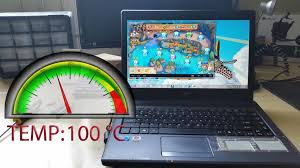Laptops get older with time they tend to overheat, which is a major issue faced by laptop users. Overheating of a laptop will not only affect its performance, it can also burn out your motherboard along with other internal components which are too expensive to fix and more importantly all your data is lost. Taking measures to avoid overheating of your laptop can help you save a fortune. Let us start diagnosing and see solutions to fix your overheating laptop.
- Removing Dust from Vents and Fans
Just like desktops, even laptops are designed to expel the heat generated by their internal components. Vents are designed to carry out the process of heat transfer.
Vents are usually provided at the bottom or at the back of the panel. There are multiple vents, some are designed to expel heat out of the laptop and some are designed to draw in cool air from outside.
You can easily locate the vents at the back of the panel or at the bottom and check if there is proper airflow.
- Airflow through these vents is usually affected by the accumulation of dust on vents and fans. You can easily remove dust from vents using a can of compressed air.
- It is easy to remove the dust from your fan if the fan is easily accessible after removing back panel. Remove the back panel, lift the fan out and blow the dust-out.
- Before returning fan to its original place, remove dust from the internal area on which fan sits.
- If the fan is not working properly due to dust and other irremovable debris, you might have to replace it with a new part.
- You can try replacing the part by looking up the user manual for the part number.
- Fast Draining Battery
A lifespan of your battery is one of the factors overheating your laptop. Charging the battery even after it is 100% or letting it drain to 0% is not an ideal way of using it. This kind of usage eventually reduces battery lifespan which leads to the generation of more heat.
If your battery is the culprit causing your laptop to overheat. You can try replacing your battery by knowing the model number of laptop and battery.
- Using Laptops on Uneven Surface
Laptops are loved because of their features like portability and convenience to use it anywhere. Hence user develops a habit of using laptops on uneven surfaces like a blanket, pillow or on their lap, which results in blocking of the air vents and obstructing the airflow.
If using laptops on such uneven surfaces is your habit, you should consider buying a laptop cooling pad, which keeps the airflow unobstructed. These might make your laptop less mobile but they will make sure that the laptop is not overheating.
- Hard Drive Overheating
Hard drives are also responsible for overheating of your laptop. This can be because of issues like an accumulation of dust, bad sectors, fans not working or too many programs running at the same time.
Overheating hard drive can cause serious damages to the laptop like damaging hard drive, system crash, and hard drive data loss.
Removing dust from your hard drive is one solution. Fixing fans and reducing the workload on the processor will reduce hard drive overheating and hence reduces heat generated in your laptop.
If none of the above-mentioned solutions help in reducing the heat generated in your laptop, consider the next solution.
- If not Hardware, it could be your Software
You might have to consider some software fixes, which deals with performance and power consumption of laptop. If you are trying to solve the excessive heat issue by the software fix, you have to give up on your laptop’s performance to save your hardware.
Open task manager, you can see what is making use of your CPU extensively. You can control apps which start automatically after Windows startup.
Installing a software which allows you to clean up history, cache files and manage start-up applications which will help you get some load off processor and make it work efficiently.
Running too many apps at the same time or trying to run software which uses your processor extensively will not only overheat your laptop, it may also lead to a system crash.
A system crash can corrupt your hard drive resulting in data loss. You can consider using Remo Recover, a data recovery software to recover files from a dead laptop hard drive. It is recommended to remove your corrupted hard drive from your dead laptop and insert into another laptop to recover your data.
